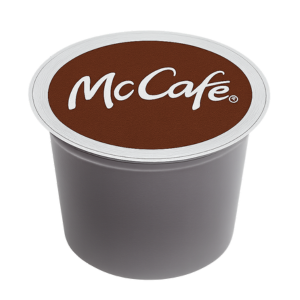
McCafé K‑Cups
Caffeine
100–120 mg
Note: Caffeine amounts are based on standard McCafé K‑Cups brewed at 8 fl oz using a Keurig machine. Actual caffeine can vary slightly depending on roast (Breakfast Blend, French Roast, or flavored varieties), brew size (6–12 oz), and machine settings.
| Attribute | Value |
|---|---|
| Caffeine Level | Moderate |
| Serving Size | 8 fl oz |
| Serving Size (ml) | 240 ml |
| Caffeine | 100–120 mg |
| Calories | 2 kcal |
| Sugar | 0 g |
| Caffeine per fl oz | 12–15 mg/fl oz |
McCafé K‑Cups bring the familiar taste of McDonald’s coffee into the convenience of a single‑serve pod. While flavor is important, many coffee drinkers are most curious about the caffeine content.
What Are McCafé K‑Cups?
McCafé K‑Cups are single‑serve coffee pods designed for Keurig brewers, offering a quick and consistent way to enjoy McDonald’s signature coffee at home.
Key features include:
- Convenience – Pre‑measured pods for consistent brewing.
- Variety – Available in multiple roasts (Premium, Breakfast Blend, French Roast, Colombian, and more).
- 100% Arabica Beans – Known for smoother flavor compared to Robusta.
- Serving Size – Typically brewed as 8 oz, though Keurig machines allow 6–12 oz options.
Together, these traits make McCafé K‑Cups a practical choice for coffee lovers who want café‑style coffee without leaving home.
Caffeine in McCafé Premium Roast K‑Cups
Premium Roast is McCafé’s flagship medium roast, balancing smooth flavor with a moderate caffeine kick.
Caffeine details:
- Serving Size – 8 fl oz (240 ml).
- Caffeine Range – 100–120 mg.
- Flavor Profile – Smooth, balanced, slightly nutty.
- Strength – Comparable to a standard brewed coffee.
- Best For – Everyday drinkers who want a reliable morning cup.
This roast offers a middle ground: flavorful without being overpowering, with enough caffeine to provide steady energy.

Caffeine in McCafé Breakfast Blend K‑Cups
The Breakfast Blend is a lighter roast, often containing slightly more caffeine per gram than darker roasts.
Caffeine details:
- Serving Size – 8 fl oz (240 ml).
- Caffeine Range – 110–120 mg.
- Flavor Profile – Bright, mild, and smooth.
- Strength – Slightly higher caffeine concentration than Premium Roast.
- Best For – Those who want a lighter taste but a strong caffeine boost.
This blend is ideal for mornings when you want a gentler flavor but still need a noticeable energy lift.
Caffeine in McCafé French Roast K‑Cups
French Roast is the darkest McCafé option, roasted longer for bold flavor but slightly less caffeine.
Caffeine details:
- Serving Size – 8 fl oz (240 ml).
- Caffeine Range – 80–100 mg.
- Flavor Profile – Smoky, bold, with a rich finish.
- Strength – Lower caffeine compared to lighter roasts.
- Best For – Coffee drinkers who prefer intensity of flavor over maximum caffeine.
Despite its strong taste, French Roast delivers less caffeine than lighter roasts, making it a good choice for those who want boldness without overstimulation.
McCafé Specialty Flavors: Do They Change the Caffeine?
McCafé also offers flavored K‑Cups such as Hazelnut, French Vanilla, and seasonal blends.
Caffeine details:
- Serving Size – 8 fl oz (240 ml).
- Caffeine Range – 100–120 mg (same as base roast).
- Flavor Profile – Added flavorings layered over medium roast coffee.
- Strength – Caffeine remains consistent across flavored and unflavored pods.
- Calories & Sugar – Flavored pods are unsweetened; sugar only comes from added creamers.
Flavored McCafé K‑Cups don’t significantly change caffeine content — they simply add variety to the drinking experience.
Factors That Affect Caffeine in McCafé K‑Cups
Even though pods are pre‑measured, several factors can influence the final caffeine in your cup.
Key factors include:
- Roast Level – Lighter roasts retain slightly more caffeine than darker roasts.
- Brew Size – Smaller cup settings (6 oz) yield stronger caffeine concentration.
- Bean Type – McCafé uses Arabica beans, which have less caffeine than Robusta.
- Machine Variability – Water temperature and brew time can affect extraction.
- Freshness – Older pods may lose some potency over time.
These factors explain why caffeine ranges are given as estimates rather than exact numbers.
